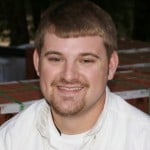⏱️ Estimated Reading Time: 7 min read
Let’s start out by telling our readers a little about you. (Current ministry context, family, joys in life, etc.)
For the last year, I have served as the pastor of preaching and theology at Occoquan Bible Church. Our church is located twenty miles south of Washington, D.C. and named after a local river that runs into the Potomac. Until last year, my family and I lived in Indiana, where I continue to support the work of a new seminary, Indianapolis Theological Seminary. I am a board member and adjunct faculty member there.
My wife and I celebrated our tenth anniversary this year. We have three energetic boys and are looking forward to welcoming our first daughter this month. Life is full, but we are thankful for all that God has given us in this season.
What are you reading right now?
Because the Bible has sixty-six books in it, I try to read sixty books at one time—or, at least, it feels that way sometimes.
In addition to commentaries on 1 Corinthians (our current sermon series), I have been reading Jamie K. A. Smith’s Desiring the Kingdom, Jim Hamilton’s biblical-theological study on Daniel (With the Clouds of Heaven), Geerhardus Vos’s Reformed Dogmatics, and few books on hermeneutics for an upcoming series in our men’s breakfast.
I just finished a couple audiobooks too, Mark Noll’s God and Race in American Politics and Eugene Peterson’s Christ Plays in Ten Thousand Places. There are more, but that’s enough to mention.
What are some books you regularly re-read and why?
The only books I regularly re-read are the Bible and the Valley of Vision. The reason for the former is obvious, but should not be taken for granted. Even in ministry, it is easy to neglect God’s Word. I have developed a pattern for reading Scripture that gets me through the New Testament at least twice in a year and the Old Testament once every sixteen months or so. While I read Scripture “for distance,” I also look for ways to study and meditate on it through writing. This shows up on my blog a few times a month.
The other book, The Valley of Vision, is a collection of Puritan prayers that gives shape to my prayer on most days. Additionally, I will return to sermons, books, and messages of John Piper, whose writings over the years have had the largest impact on me.
What biographies or autobiographies have you read recently?
I am currently reading Calvin’s Company of Pastors, a historical account of pastoral ministry in Geneva, by Scott Manetsch. That has been my Sunday afternoon reading since last Fall. Before that, I read the abridged version of Iain Murray’s biography on Martyn Lloyd-Jones. Over the years, other important biographies have been Alexander Haldane’s account of Robert and James Haldane, Richard Wurmbrand’s Tortured for Christ, and all of John Piper’s biographical sermons.
Speaking of biographies and such, is there any particular one that has influenced you a great deal in your faith?
Again, Piper’s biographical sermons have probably been most influential. I’ve listened to all of them multiple times. I remember listening to his biography on John Owen as I drove into Indianapolis (circa 2003). While listening, I was overwhelmed by a holy desire to preach; that sermon helped clarify my calling to pastoral ministry. Likewise, the message of Spurgeon’s troubles has given me a real sense of the trials ministers face. Much of my theology of suffering came from those sermonic biographies. Other biographies have widened my heart for missions and encouraged me to abide in the work.
If you were sitting down with a fellow believer and they asked for your top five book recommendations on Christian living, what would they be?
There are a lot of variables that would shape my answer—Is this a new believer? Do they read? Can they read? Do they have time to read? Or, do they, like many in my congregation, need to listen to books as they spend two hours commuting?
So, with those factors in mind, here is a short list of topics I’d want to emphasize. Each topic has two books, the first book is long, the second shorter.
- Religious Affections. Desiring God or The Dangerous Duty of Delight by John Piper
- Spiritual Disciplines and Prayer: Spiritual Disciplines for the Christian Life or Praying the Bible by Donald Whitney
- Discipleship: The Master Plan of Evangelism by Robert Coleman or Discipling by Mark Dever
- Bible and Hermeneutics: According to Plan by Graeme Goldsworthy or God’s Big Picture by Vaughn Roberts
- Missions and Evangelism: Operation World or Pray for the World by Patrick Johnstone
If I were to add anything else it would be related to the nature and ministry of the local church. Anything from the brothers at 9 Marks would be suitable.
What books have molded how you serve and lead others in the gospel?
Surely there were books that helped form me in gospel ministry. I’ve mentioned some of them above, but more than books are people, churches, and ministries. I’ll mention three and include a book with each.
First, Campus Crusade for Christ played a significant role in shaping my understanding of disciple-making. Yes, we read Robert Coleman’s book on Jesus’ approach to evangelism, but it was Phil Gillespie who yanked me out my dorm room to share my faith that made the truths of the book come to life. To this day personal disciple-making has been a passion, instilled through Cru.
Next, the pastors at Woodland Park Baptist Church modeled expositional preaching, elder leadership, and received ministry. The first two concepts are probably familiar to most readers. The third idea may be less common. It is the idea that ministry is not achieved through self-appointed volunteerism but received as we abide in Christ and give ourselves to the opportunities God provides. For more than a decade, this approach to ministry (described here) has guided many decisions and protected me from all kinds of ministerial disappointments. I suppose if there was any book that captures a similar mindset, it is John Piper’s Brothers, We Are Not Professionals.
Last, the biblical theology of Southern Seminary influences every sermon I preach and every article I write. While Southern Seminary is often pegged as “Calvinistic,” it is more accurate to say it is Christocentric. Spending nine years at SBTS, the biblical theology of Albert Mohler, Russell Moore, Steve Wellum, and Tom Schreiner shaped my vision for the way Scripture should be read and proclaimed. Now as a pastor and teacher of theology, I ground everything in a redemptive-historical approach that puts Jesus at the center. The works of Graeme Goldsworthy has been most illuminating in this respect, and was for me and many of my peers at Southern a paradigm-shaping book.
Finally, let’s conclude with this question. What are you learning about life and daily following Jesus?
The biggest thing I am learning right now is that if I am going to last in ministry I must cultivate habits that disconnect from the technologies and social media beckoning for my attention. While there is a place for such online connectivity, I am relearning patterns of study and meditation that are not connected to my computer.
When I first started walking with Jesus, I would read and journal for hours at time—without a single distraction from phones, computers, or social media. Now, however, with instant access to information, I struggle to meditate like I once did. Therefore, I am looking for more paper and pen ways to read, think, pray, and study. What is lost in efficiency, I gain back with fewer distractions.
This is the biggest thing I am learning and laboring to apply in my walk with Christ. Maybe someday I’ll write my thoughts down on paper and then upload them online.




